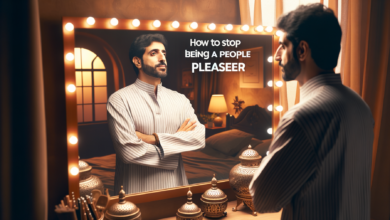How to Avoid Jumping to Conclusions

Ever Jump to Conclusions?
Have you ever found yourself drawing a hasty conclusion about someone or something before you had all the facts? It’s something we all do from time to time. This mental shortcut is known as “jumping to conclusions,” and while it might feel efficient, it can have potential negative repercussions on our relationships, work, and overall wellbeing. Understanding how to steer clear of this cognitive pitfall is critical for personal development and better decision-making.
Identifying the Causes of Hasty Judgments
Firstly, what leads us to jump to conclusions? Often, it’s a matter of cognitive biases or past experiences that cloud our judgment. By recognizing these triggers, we’re better positioned to address them head-on. For example, the Confirmation Bias can cause us to prioritize information that confirms our existing beliefs while ignoring evidence to the contrary. Have you ever caught yourself doing that? It’s quite common but being aware of it is the first step toward change.
Slow Down: The Virtue of Patience in Thought
In our fast-paced world, there’s a tendency to think and act quickly. However, slowing down can be beneficial. When you’re presented with a situation that requires evaluation, take a moment before forming an opinion or a decision. Simple actions like taking a deep breath can give your brain the extra time it needs to fully process information. Think about it as pressing the pause button on your thoughts; it helps you avoid the “fast-forward” errors that jumping to conclusions can cause.
Seek the Full Picture: The Art of Gathering Information
- Ask Questions: Cultivate a curious mindset. When you’re tempted to arrive at a quick judgment, question why you feel that way. What evidence do you have? What’s still unknown?
- Listen Actively: Listen not just to respond, but to understand. Active listening involves paying full attention, taking time to process, and then engaging with what’s being said.
- Research: Don’t rely on assumptions. If something’s unclear or incomplete, do a bit more digging. This doesn’t mean you’ll need to spend hours on every decision, but rather to seek enough context to be well-informed.
Critical Thinking: An Ally in Decision-Making
Critical thinking is essential in making impartial judgments. It involves analyzing facts and logical reasoning to form a conclusion. It can be a buffer against jumping to conclusions. To practice critical thinking:
- Separate Fact from Opinion: Understand the difference between objective facts and someone’s subjective viewpoint.
- Evaluate Evidence: Scrutinize the information you have. What’s the source? Is it credible and relevant?
- Consider Alternative Perspectives: Challenge your point of view by considering how others might interpret the same information.
- Reflect on the Consequences: Before acting on your conclusion, consider the potential outcomes of being wrong.
Embracing Humility: Acknowledge Uncertainty
Recognizing that we don’t have all the answers can be a humbling experience. It’s important to accept that uncertainty is a part of life. We are not infallible, and acknowledging this fact is not a sign of weakness but a strength. It opens us to new perspectives and creates a space for understanding and growth.
Benefit from Collective Wisdom
Two heads are often better than one. When you’re unsure, seek the insights and experiences of others. Whether friends, family, or colleagues, other people can provide different angles and considerations that might not have occurred to you. Discussion can be a powerful tool in reaching a reasoned conclusion rather than an abrupt one.
Practicing Mindfulness: Stay Grounded in the Present
Mindfulness is a practice that involves being fully present and engaged in the here and now. It helps to prevent our mind from making leaps based on past experiences or future worries. Techniques like meditation and focused attention can ground you in the moment and make you less prone to premature judgment.
Recognize the Impact of Emotions
Our emotions play a significant role in how we interpret information. Being aware of how you’re feeling is crucial. Anger, sadness, or even excitement can skew our perception and lead to hasty conclusions. When you notice strong emotions, acknowledge them, but try to set them aside when you need to evaluate something critically.
Avoid Stereotyping: Seeing Beyond Labels
Stereotypes are oversimplified and generalized beliefs about groups of people that can lead us to jump to conclusions about individuals. Always strive to see people as individuals with their own unique traits and stories. This helps in mitigating unfounded prejudices and promotes fair judgment.
Mind the Language: Reflective over Reactive
The language we use, even in our thoughts, can predispose us to jumping to conclusions. For instance, using absolute terms like “always” or “never” may close off the possibility of nuance or exception. Instead, use reflective language that leaves room for additional information, such as “sometimes” or “may be.”
Write It Down: The Clarity of Pen on Paper
Writing out the situation and your thoughts can be surprisingly effective in organizing your thinking. It forces you to slow down and consider each point more carefully. Plus, seeing your thoughts on paper can make it easier to identify where you might be jumping to conclusions without sufficient evidence.
Establish a Wait Period
For significant decisions that have the luxury of time, set a wait period before concluding. Commit to giving yourself a day or two to mull over the information you’ve gathered. Often, with time, our perspective can shift and a clearer picture emerges.
Stay in Learning Mode
Approach life with a learner’s attitude, where every experience offers a chance to gain more insight. Remain open and flexible in your thinking, ready to adapt your conclusions when new information presents itself. Maintaining this posture ensures that you are less likely to jump to conclusions and more inclined to thoughtful evaluation.
Finishing Thoughts
Avoiding the jump to immediate conclusions is challenging, especially in a society that values quick thinking and decision-making. However, mastering the art of patience and in-depth analysis in our judgments is not just a wise move, it’s often necessary for sound decision-making and building harmonious relationships. It’s about striking the right balance between being efficiently decisive and thoughtfully reflective.
Remember, jumping to conclusions isn’t just about missing out on accuracy; it can lead to misunderstandings and mishaps that affect real lives and real situations. By cultivating a more mindful, patient, and humble approach to our thoughts and decisions, we foster a level of personal development that resonates not just within ourselves but also vibrates positively in our interactions with others. It’s a commitment to the thoughtful side of our human nature, one that recognizes complexity and embraces wisdom. So the next time you’re on the verge of a snap judgment, pause, ponder, and proceed with a clearer, more reasoned perspective.




